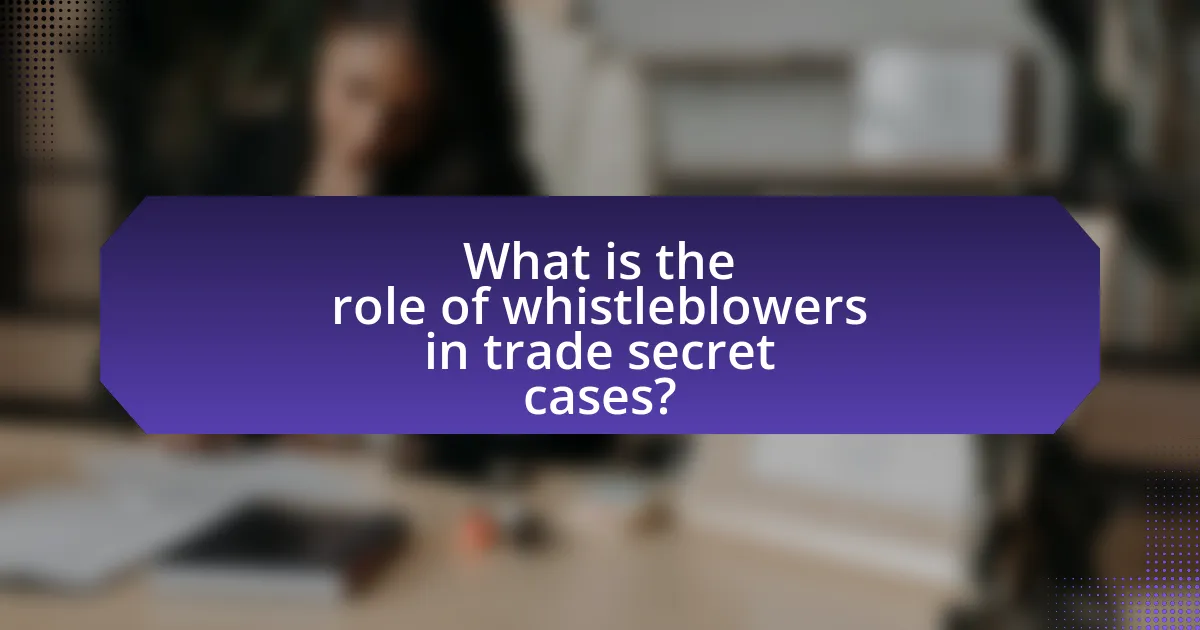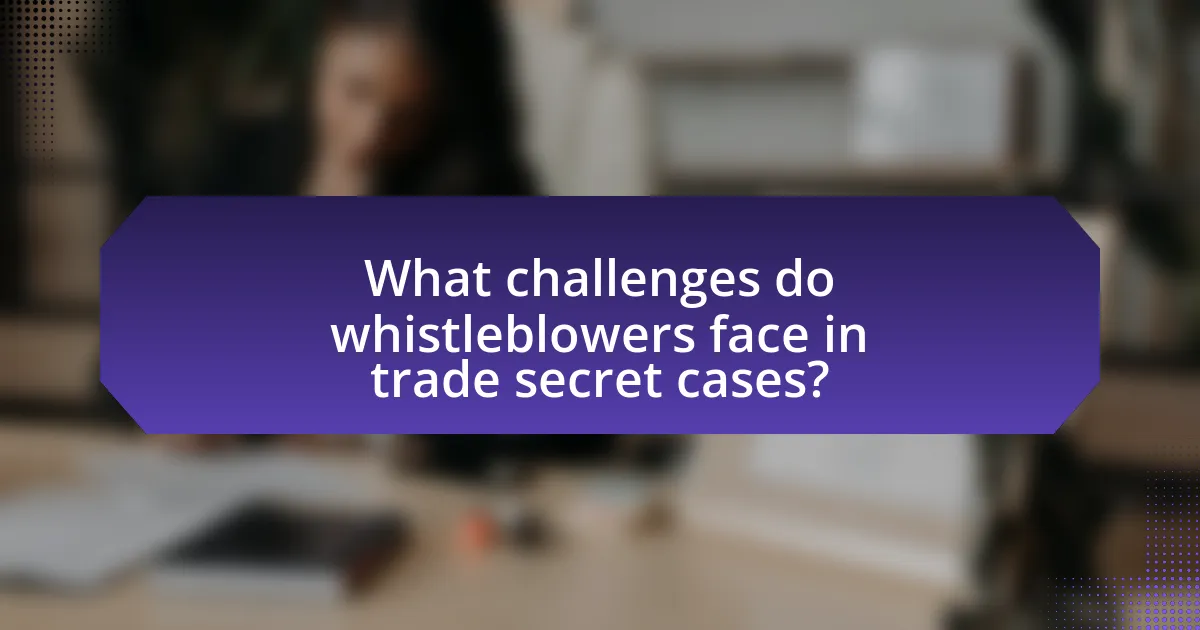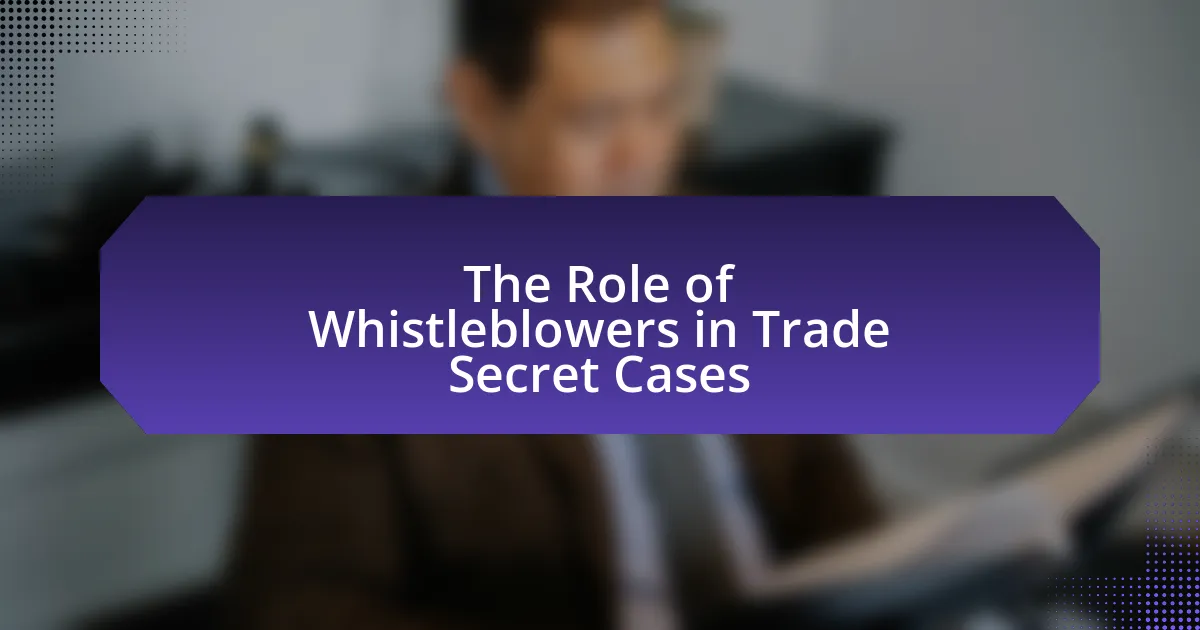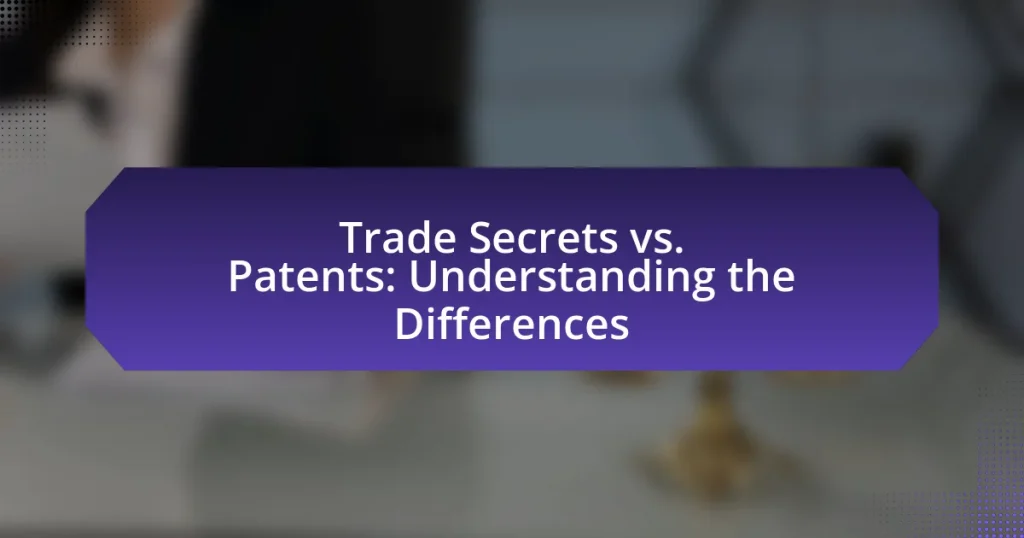Whistleblowers are individuals who expose unlawful practices related to the misappropriation of trade secrets, playing a vital role in legal actions against companies or individuals involved in such misconduct. The article examines the significance of whistleblowers in trade secret cases, detailing their contributions to the protection of confidential information, the motivations behind their disclosures, and the legal protections available to them. It also addresses the challenges whistleblowers face, including retaliation and psychological impacts, while highlighting the strategies organizations employ to manage whistleblower reports. Furthermore, the article explores the implications of whistleblowing for trade secret litigation and the best practices for ensuring credible and effective reporting.

What is the role of whistleblowers in trade secret cases?
Whistleblowers play a crucial role in trade secret cases by exposing unlawful practices related to the misappropriation of confidential information. Their disclosures can lead to investigations and legal actions against companies or individuals who engage in stealing or improperly using trade secrets. For instance, the Defend Trade Secrets Act of 2016 provides legal protections for whistleblowers, encouraging them to report violations without fear of retaliation. This law has been instrumental in facilitating the reporting of trade secret theft, as evidenced by a significant increase in cases brought to court following its enactment.
How do whistleblowers contribute to the protection of trade secrets?
Whistleblowers contribute to the protection of trade secrets by exposing unlawful practices that threaten the confidentiality of proprietary information. Their disclosures often reveal instances of corporate espionage, fraud, or unethical behavior that could lead to the unauthorized sharing or theft of trade secrets. For example, the Sarbanes-Oxley Act of 2002 encourages whistleblowing by providing legal protections for individuals who report violations, thereby fostering an environment where employees feel safe to report misconduct. This legal framework helps safeguard trade secrets by ensuring that potential breaches are addressed promptly, reducing the risk of information leaks that could harm a company’s competitive advantage.
What motivations drive individuals to become whistleblowers in trade secret cases?
Individuals become whistleblowers in trade secret cases primarily due to a strong sense of ethics and the desire to expose wrongdoing. This motivation often stems from witnessing illegal activities, such as corporate fraud or unethical practices, that violate laws or regulations. Research indicates that personal values, such as integrity and accountability, significantly influence the decision to report misconduct. For instance, a study published in the Journal of Business Ethics found that 70% of whistleblowers cited moral obligation as their primary reason for reporting, highlighting the ethical dimension of their motivations. Additionally, the potential for financial rewards, such as monetary incentives under whistleblower protection laws, can also drive individuals to come forward, as seen in cases where whistleblowers receive substantial payouts for exposing trade secret theft.
How do whistleblowers identify and report trade secret violations?
Whistleblowers identify trade secret violations by observing unauthorized access, use, or disclosure of confidential information within their organizations. They typically report these violations through internal channels, such as compliance hotlines or designated ethics officers, or externally to regulatory bodies like the Securities and Exchange Commission (SEC) or the Department of Justice (DOJ). For instance, the Whistleblower Protection Act provides legal safeguards for individuals who report such violations, encouraging them to come forward with credible evidence.
What legal protections are available for whistleblowers in trade secret cases?
Whistleblowers in trade secret cases are protected under various legal frameworks, primarily the Defend Trade Secrets Act (DTSA) and state laws. The DTSA provides immunity from civil and criminal liability for individuals who disclose trade secrets to government officials or attorneys for the purpose of reporting or investigating a violation of law. Additionally, many states have enacted their own whistleblower protection laws that safeguard employees from retaliation when they report trade secret misappropriation. These protections are crucial as they encourage individuals to come forward without fear of losing their jobs or facing legal repercussions.
What laws safeguard whistleblowers from retaliation?
The laws that safeguard whistleblowers from retaliation include the Whistleblower Protection Act (WPA) of 1989, which protects federal employees who disclose information about illegal activities or misconduct within the government. Additionally, various state laws provide similar protections, and the Sarbanes-Oxley Act of 2002 protects employees of publicly traded companies who report fraudulent activities. The Dodd-Frank Wall Street Reform and Consumer Protection Act further enhances protections by offering monetary rewards for whistleblowers who provide information leading to successful enforcement actions. These laws collectively aim to encourage reporting of wrongdoing without fear of adverse consequences.
How do these protections vary across different jurisdictions?
Protections for whistleblowers in trade secret cases vary significantly across different jurisdictions. In the United States, the Defend Trade Secrets Act (DTSA) provides federal protections, allowing whistleblowers to report trade secret theft without fear of retaliation, while some states have additional laws that enhance these protections. Conversely, in the European Union, the Whistleblower Protection Directive mandates member states to implement laws that protect whistleblowers from retaliation, but the specifics can differ based on national legislation. For instance, countries like Germany have robust protections, while others may have less comprehensive frameworks. This variation is influenced by cultural attitudes towards whistleblowing, legal traditions, and the prioritization of corporate confidentiality versus individual rights.

What challenges do whistleblowers face in trade secret cases?
Whistleblowers in trade secret cases face significant challenges, including retaliation from employers, legal repercussions, and emotional distress. Retaliation can manifest as job loss, harassment, or blacklisting, which discourages individuals from reporting misconduct. Legal repercussions may involve complex litigation, as whistleblowers often confront powerful corporations with extensive resources to defend against claims. Emotional distress arises from the isolation and stress associated with exposing wrongdoing, which can impact mental health and personal relationships. These challenges are documented in studies, such as the 2018 report by the Government Accountability Project, which highlights the risks and consequences faced by whistleblowers in various sectors, including those involving trade secrets.
What risks are associated with whistleblowing in trade secret disputes?
Whistleblowing in trade secret disputes carries significant risks, including potential retaliation from employers, legal repercussions, and damage to personal reputation. Employees who report misconduct may face job loss, harassment, or legal action from their employer, as evidenced by the 2019 report from the National Whistleblower Center, which highlighted that 30% of whistleblowers experienced retaliation. Additionally, whistleblowers may encounter challenges in securing future employment due to the stigma associated with their actions, as noted in studies indicating that many employers are hesitant to hire individuals with a history of whistleblowing. These risks underscore the complex environment in which whistleblowers operate, often deterring individuals from coming forward despite the potential for legal protections under laws such as the Whistleblower Protection Act.
How can whistleblowers mitigate the risks of retaliation?
Whistleblowers can mitigate the risks of retaliation by utilizing legal protections, such as reporting through established channels that ensure confidentiality. These channels often include internal reporting systems or external regulatory bodies that provide anonymity and legal safeguards against retaliation. For instance, the Whistleblower Protection Act in the United States offers protections for individuals who report misconduct, ensuring they cannot be fired or discriminated against for their disclosures. Additionally, whistleblowers can seek legal counsel to understand their rights and the protections available to them, which further empowers them to report wrongdoing without fear of adverse consequences.
What psychological impacts do whistleblowers experience during and after reporting?
Whistleblowers experience significant psychological impacts during and after reporting, including anxiety, depression, and social isolation. Research indicates that the stress of facing retaliation, job loss, or ostracism can lead to long-term mental health issues. A study published in the Journal of Business Ethics found that 60% of whistleblowers reported experiencing psychological distress, with many facing a decline in their overall well-being due to the backlash from their organizations. Additionally, the fear of negative consequences can create a pervasive sense of vulnerability, further exacerbating feelings of isolation and anxiety.
How do organizations respond to whistleblowers in trade secret cases?
Organizations typically respond to whistleblowers in trade secret cases by conducting internal investigations, implementing protective measures, and sometimes retaliating against the whistleblower. When a whistleblower reports potential violations, organizations often initiate a thorough inquiry to assess the validity of the claims, which may involve reviewing documents and interviewing relevant personnel. According to the National Whistleblower Center, retaliation against whistleblowers can include termination, demotion, or harassment, which underscores the risks faced by individuals who expose wrongdoing. Additionally, organizations may enhance their compliance programs to prevent future incidents and protect sensitive information, demonstrating a dual approach of addressing the immediate concern while attempting to mitigate reputational damage.
What strategies do companies employ to handle whistleblower reports?
Companies employ several strategies to handle whistleblower reports effectively, including establishing clear reporting channels, ensuring confidentiality, and providing anti-retaliation protections. Clear reporting channels, such as dedicated hotlines or online platforms, facilitate the submission of reports while maintaining anonymity. Ensuring confidentiality protects the identity of the whistleblower, which encourages more individuals to come forward. Additionally, implementing robust anti-retaliation policies safeguards whistleblowers from negative consequences, fostering a culture of transparency and accountability. These strategies are supported by research indicating that organizations with strong whistleblower protections experience higher reporting rates and improved organizational integrity.
How can organizations foster a culture of transparency and support for whistleblowers?
Organizations can foster a culture of transparency and support for whistleblowers by implementing clear policies that protect whistleblowers from retaliation and by promoting open communication channels. Establishing a formal whistleblower policy that outlines protections and procedures encourages employees to report unethical behavior without fear. Additionally, training programs that educate employees about the importance of whistleblowing and the mechanisms available for reporting can enhance awareness and trust. Research indicates that organizations with strong ethical cultures, where leadership actively supports transparency, see higher rates of reporting and lower instances of misconduct. For example, a study by the Ethics & Compliance Initiative found that organizations with effective whistleblower protections experience 50% fewer incidents of misconduct.

What are the implications of whistleblowing for trade secret litigation?
Whistleblowing significantly impacts trade secret litigation by potentially exposing confidential information, which can lead to legal challenges for both the whistleblower and the organization involved. When a whistleblower discloses trade secrets, it may result in the loss of competitive advantage for the company, prompting litigation to protect those secrets. Additionally, whistleblowers may be protected under laws such as the Whistleblower Protection Act, which can influence the legal landscape by providing them with safeguards against retaliation, thereby encouraging disclosures that could lead to legal actions against companies for misappropriation of trade secrets. This dynamic creates a complex interplay between the need for corporate confidentiality and the legal protections afforded to individuals who report wrongdoing.
How does whistleblower testimony influence trade secret cases?
Whistleblower testimony significantly influences trade secret cases by providing critical evidence that can substantiate claims of misappropriation or theft. This testimony often reveals insider knowledge about the practices and policies of a company, which can be pivotal in establishing whether trade secrets were unlawfully acquired or disclosed. For instance, in the case of E.I. du Pont de Nemours and Company v. Kolon Industries, Inc., whistleblower information was instrumental in demonstrating that Kolon had engaged in a systematic effort to steal DuPont’s trade secrets related to Kevlar production. Such testimony not only strengthens the legal position of the party alleging trade secret theft but also can lead to increased scrutiny and potential penalties for the accused party, thereby underscoring the importance of whistleblower contributions in these legal contexts.
What role do whistleblowers play in gathering evidence for litigation?
Whistleblowers play a crucial role in gathering evidence for litigation by providing insider information that can substantiate claims of wrongdoing. Their firsthand knowledge often includes access to confidential documents, communications, and practices that are not available to external parties. For instance, in cases involving trade secrets, whistleblowers can reveal how proprietary information was misappropriated or misused, which is essential for establishing the basis of a legal claim. Studies indicate that whistleblower disclosures have led to significant legal actions, with the U.S. Securities and Exchange Commission reporting over $1 billion in financial recoveries attributed to whistleblower tips from 2011 to 2021. This demonstrates the tangible impact that whistleblowers have on the success of litigation efforts.
How can whistleblower disclosures affect the outcome of trade secret disputes?
Whistleblower disclosures can significantly influence the outcome of trade secret disputes by providing critical evidence that may validate claims of misappropriation. When a whistleblower reveals information about the improper use or theft of trade secrets, this disclosure can lead to investigations that uncover additional evidence, thereby strengthening the case against the accused party. For instance, in the case of E.I. du Pont de Nemours and Company v. Kolon Industries, Inc., whistleblower testimony was pivotal in demonstrating that Kolon had misappropriated DuPont’s trade secrets related to Kevlar production, ultimately resulting in a substantial verdict against Kolon. Such disclosures not only enhance the credibility of the party bringing the claim but also can lead to legal protections for the whistleblower under laws like the Defend Trade Secrets Act, which encourages reporting of trade secret violations.
What best practices should whistleblowers follow when reporting trade secret violations?
Whistleblowers should document all relevant evidence before reporting trade secret violations. This includes gathering emails, documents, and any other materials that substantiate the claim. Proper documentation is crucial as it provides a factual basis for the allegations and can protect the whistleblower from potential retaliation. Additionally, whistleblowers should familiarize themselves with the legal protections available under laws such as the Defend Trade Secrets Act, which offers safeguards against retaliation for reporting violations. Consulting with a legal expert can also ensure that the whistleblower understands their rights and the proper channels for reporting. Following these best practices enhances the credibility of the report and increases the likelihood of a successful investigation.
How can whistleblowers ensure their reports are credible and effective?
Whistleblowers can ensure their reports are credible and effective by providing detailed, factual evidence to support their claims. This includes documenting specific incidents, gathering corroborating witness statements, and collecting relevant documents or communications that substantiate the allegations. For instance, a study by the Association of Certified Fraud Examiners found that detailed documentation significantly increases the likelihood of a successful investigation, as it allows authorities to verify claims and take appropriate action. Additionally, whistleblowers should report their findings to the appropriate regulatory bodies or legal entities that have the authority to address the issues raised, ensuring that their reports reach the right audience for effective resolution.
What resources are available to assist whistleblowers in navigating the reporting process?
Resources available to assist whistleblowers in navigating the reporting process include legal aid organizations, government hotlines, and whistleblower protection laws. Legal aid organizations, such as the National Whistleblower Center, provide guidance on legal rights and the reporting process. Government hotlines, like the U.S. Securities and Exchange Commission’s whistleblower program, offer confidential reporting options and potential financial rewards for information leading to enforcement actions. Additionally, laws such as the Whistleblower Protection Act safeguard whistleblowers from retaliation, ensuring they can report misconduct without fear of losing their jobs. These resources collectively empower individuals to report wrongdoing effectively and safely.



